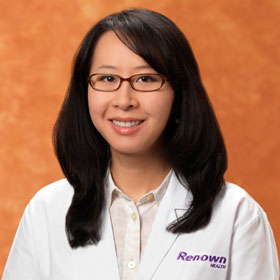Integrative Medicine Is a Patient-Centered Model
 Samanda Durand, DO, a Diplomate of the American Board of Physicians Specialties® (ABPS) and integrative medicine practitioner in Nevada, credits her patients for inspiring her to embrace integrative medicine. “I was seeing patients with lots of chronic conditions who were not only dealing with their illnesses, but who also had things like poor stress management, poor sleep, and sometimes pain,” Dr. Durand says, “and I wanted to be more than the person coordinating their care. I wanted to offer them options.”
Samanda Durand, DO, a Diplomate of the American Board of Physicians Specialties® (ABPS) and integrative medicine practitioner in Nevada, credits her patients for inspiring her to embrace integrative medicine. “I was seeing patients with lots of chronic conditions who were not only dealing with their illnesses, but who also had things like poor stress management, poor sleep, and sometimes pain,” Dr. Durand says, “and I wanted to be more than the person coordinating their care. I wanted to offer them options.”
In integrative medicine, there is no one right therapy option. Instead, an integrative medicine physician uses all appropriate therapeutic approaches to help patients achieve optimal health and healing. To establish what’s appropriate, physicians must first focus on the patient as a whole, as opposed to considering only the patient’s symptoms. Integrative medicine physicians examine virtually every aspect of their patients’ lives, including diet, exercise habits, and their ability to manage stress.
“Integrative medicine is a patient-centered model that uses evidence-based therapies,” Dr. Durand says. This means practitioners are as likely to use conventional medicine, pharmaceuticals, or surgery, as they are to use complementary or alternative therapies. “The main focus of integrative medicine is the patient,” she emphasizes, “so we work with the patient on what their goals are in terms of health and wellness.”
Complementary or alternative therapies espoused by integrative medicine practitioners like Dr. Durand include healing traditions such as acupuncture, traditional Chinese medicine, and yoga, or lifestyle changes such as getting more exercise, eating a more nutritious diet, or adopting a mindfulness practice like meditation.
Ultimately, Dr. Durand says her goal is to educate her patients by informing them about other therapies they can use to improve their health and wellness. The ABPS proudly endorses the efforts of Dr. Durand and its other Diplomates who publicly advocate for the highest level of patient care in their chosen specialties.
The ABPS offers physician board certification in integrative medicine through its Member Board, the American Board of Integrative Medicine® (ABOIM®). To learn more about the evidence-based practice of integrative medicine, or for information about earning physician board certification through the ABOIM, contact the APBS today.






